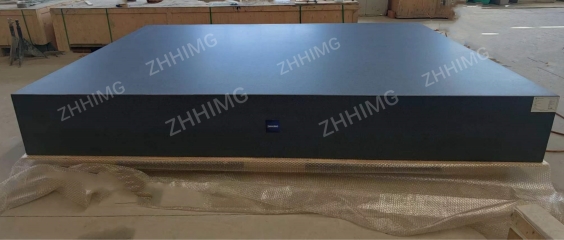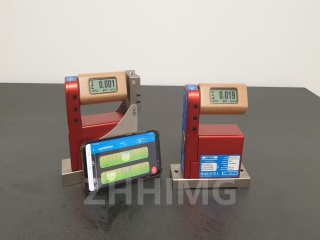In the manufacturing process of lithium batteries, the coating machine, as a key piece of equipment, its base performance directly affects the coating accuracy and product quality of lithium batteries. Temperature variation is an important factor affecting the stability of coating machines. The difference in temperature resistance between granite bases and cast iron bases has become a key consideration for equipment selection in lithium battery manufacturing enterprises.
Coefficient of thermal expansion: The "temperature immunity" advantage of granite
The coefficient of thermal expansion determines the dimensional stability of the material when the temperature changes. The coefficient of thermal expansion of the cast iron base is approximately 10-12 ×10⁻⁶/℃. In the common temperature fluctuation environment of lithium battery coating workshops, even minor temperature changes can cause significant dimensional deformation. For instance, when the temperature in the workshop fluctuates by 5℃, a 1-meter-long cast iron base may undergo a 50-60 μm expansion and contraction deformation. This deformation will cause a change in the gap between the coating roller and the electrode sheet, resulting in an uneven coating thickness and subsequently affecting the capacity and consistency of lithium batteries.

In contrast, the coefficient of thermal expansion of the granite base is only (4-8) ×10⁻⁶/℃, which is approximately half that of cast iron. Under the same temperature fluctuation of 5℃, the deformation of the 1-meter-long granite base is only 20-40 μm, and the dimensional change can almost be ignored. During the long-term continuous production process, the granite base can always maintain a stable shape, ensuring the precise relative position between the coating roller and the electrode sheet, maintaining the stability of the coating process, and providing a reliable guarantee for the production of highly consistent lithium batteries.
Thermal conductivity: The "heat insulation barrier" characteristic of granite
In addition to the dimensional changes caused by thermal expansion, the thermal conductivity of materials also affects the uniformity of temperature distribution in equipment. Cast iron has good thermal conductivity. When heat is generated inside the coating machine due to motor operation, friction of the coating roller, etc., the cast iron base will rapidly conduct heat, causing the surface temperature of the base to rise and become unevenly distributed. This temperature difference will cause thermal stress on the base, further intensifying deformation. At the same time, it may also affect the normal operation of the surrounding precision sensors and control components.
Granite is a poor conductor of heat, with a thermal conductivity of only 2.7-3.3W/ (m · K), which is much lower than that of cast iron at 40-60W/ (m · K). During the operation of the coating machine, the granite base can effectively block the conduction of internal heat, reducing the temperature fluctuations on the base surface and the generation of thermal stress. Even if the coating machine operates under high load for a long time, the granite base can still maintain a relatively stable temperature state, avoiding equipment deformation and performance degradation caused by uneven temperature, and creating a stable temperature environment for the coating process.
Stability under temperature cycling: The "long-term temperature resistance" ability of granite
The production of lithium batteries usually requires equipment to operate continuously for a long time. During frequent temperature cycles (such as cooling at night and heating during the day), the stability of the base material is of vital importance. Under the repeated effect of thermal expansion and contraction, the cast iron base is prone to fatigue cracks inside, resulting in a decrease in structural strength and affecting the service life of the equipment. Relevant research data show that after 1000 temperature cycles (with a temperature variation range of 20-40℃), the surface crack depth of the cast iron base can reach 0.1-0.2mm.
Granite bases have excellent fatigue resistance due to their dense internal mineral crystal structure. Under the same temperature cycling test conditions, the granite base hardly shows obvious cracks, and the structural integrity is maintained for a long time. This high stability under temperature cycling enables the granite base to meet the high-intensity and long-term operation requirements of lithium battery production, reducing the maintenance frequency and downtime of equipment caused by base problems and improving production efficiency.
Against the backdrop of increasingly strict requirements for precision and stability in lithium battery manufacturing, granite bases, with their lower coefficient of thermal expansion, superior thermal conductivity and outstanding temperature cycling stability, significantly outperform cast iron bases in terms of temperature resistance. Choosing a lithium battery coating machine with a granite base can effectively enhance coating accuracy, ensure the quality of lithium battery products, reduce equipment risks during the production process, and become an important support for promoting the development of the lithium battery industry towards higher performance
Post time: May-21-2025

